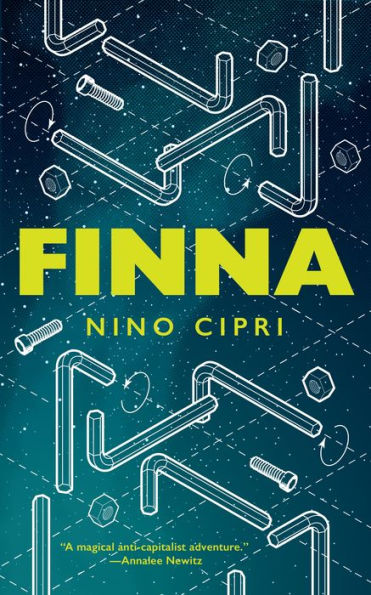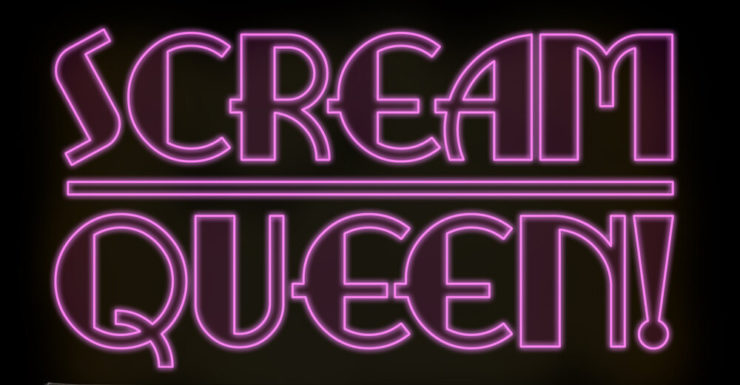For the penultimate post of our ten-year retrospective, I thought I’d recommend something fresh… which also happens to (sorta-retrospectively!) cover a genre I don’t often tackle: Scream, Queen!, the horror film podcast. With the finale for season two coming up, this podcast has cemented itself as a hands-down favorite for me, because I too was a weird kid who cut their teeth on horror VHS tapes smuggled out of the Blockbuster or binged at friends’ houses. Scary stories, strange happenings, and things that go bump in the night hold a visceral, endless fascination for me—which, anecdotally, resonates with a ton of other queer folks across the world too…but I don’t often see these movies explored from that angle.
So: Scream, Queen!
Per the introductory tagline, it’s “a podcast about scary movies, by people not typically depicted in scary movies.” The hosts are Los Angeles-based photographer and videographer Drea Washington and indigenous queer poet Tommy Pico—whom podcast aficionados will recognize from the brilliant Food4Thot. These hosts approach scary movies across the decades from a black/queer/indigenous perspective, with each episode following a three-act structure of a short intro segment, a main discussion on a given film or two, and a chosen scream queen of the week to close. They covers classics like I Know What You Did Last Summer or Tales from the Crypt: Demon Knight—but also new movies!
Also, definitely worth mentioning, there are episode titles like “Sabrina and the Manic Pixie Bisexual Sex Torture Demons.”
Opening each episode with a deliciously long cackle, Tommy and Drea bring a theatrical flair to the typical pop culture podcast; their mix of critical insight, clever gags, and dedicated horror fandom make for an unforgettable listening experience. The Act I intros alone showcase their hilarious rapport—like the recurring segment “What I Woulda Done Was,” which lets us all engage in the schadenfreude of thinking why on earth did she go back in the house, I woulda… via the razor-sharp repartee of two talented speakers. As a performing poet Tommy brings fantastic vocal tone and pacing that I admire (a supreme delight in an audio medium) while Drea similarly brings an incisively witty, outright gut-busting sense of humor (and willingness to rib her co-host).
Scream, Queen!’s biggest charm is that it runs on the intimate candor and playful verbal sparring of two good friends who also happen to be sharp-eyed critics, sharing their thoughts on some most-beloved and often most-ridiculous scary movies. Much like the texts under discussion, the podcast balances camp and seriousness, schlock and art. Neither of our illustrious hosts see a problem with treating movies as patently ridiculous as Triassic Attack with a healthy mix of serious, respectful appraisal and endearing love for…well, awesomely silly garbage. It’s thoughtful, socially-engaged media criticism, sure, but it’s very much also fun.
Buy the Book


Finna
A recommended episode that encompasses the energy™ of the podcast for a first-time listener might be “Diné Don’t Believe in White Man’s Afterlife.” The Act I segment explores Nightmare on Elm Street 2, which our hosts describe in the show-notes as “the gayest movie in American history.” Drea and Tommy discuss the queer subtext (or, flat-out text) of the film alongside the personal experiences of Mark Patton—the actor who played Jesse Walsh—as a gay actor facing discrimination in Hollywood. For example, in response to the critical panning of the film (as Tommy notes, in part due to homophobia) the screenwriter David Chaskin blamed Patton for bringing in gay content…when it was in the script from the jump. Act II’s main discussion is on Netflix’s Chambers and real experiences of reservation life in critique of the show, while Act III uplifts scream queen Naomie Harris from 28 Days Later. The episode has it all: social commentary, jokes about sucking on Freddy’s claw, and a quality conclusion that brought good laughs.
Another aspect of the show that grips the listener’s attention (say, through a decadent social-distancing-oriented podcast binge) is Drea and Tommy’s ability to range far and wide through the film decades—and their main topics. There are episodes like “Black History is Black Horror,” which focuses on the documentary Horror Noir: A History of Blackness in Scary Movies and the cultural/historical/political implications of Blackness in the horror genre. Others—for example the episode titled “This is Some Real Shit”—take a general topic (like IRL scares) and explore the subject from multiple angles. Our hosts first examine how scary movies affect them…but then they shift to fold in scary things that happen on films sets, like the story of Mercedes McCambridge in The Exorcist and how ageism, sexism, and other institutional pressures combined to hide her astounding, painful labor as the voice of possession.
As you might’ve noticed, a lot of the movies featured aren’t themselves queer, per se…but the reading is. The personal attachments and anecdotes shared by the hosts are, as well as the frequent acknowledgement of the crooked-mirror versions of ourselves we see sometimes in monsters or in the girls (because it’s so often girls) these movies put through the wringer. While most of the other posts in the QSFF series are about specific queer texts, I also want to point up the readings and interpretations that individual queer people bring to the table when they consume media. Perspectives outside that mainstream, heteronormative, white, cisgender gaze also exist and have things to say that are valuable about the same texts from an alternate angle. Paying attention to queer critics and queer readings—and how those readings interact with and change the media they engage—does a body good!
And, more than that…personally, it lets me enjoy a pop culture podcast about scary movies in a way I never have before. Tommy and Drea talk about these movies in a manner that reflects how I saw them, with critique alongside their appreciation, in a way that makes me feel welcomed home to that youthful fascination with the frightening, the spooky, the monstrous. A weight lifts off the shoulders for me when queer vibes, queer ways of looking, are represented, you know? A podcast about scary movies, by people not typically depicted in scary movies: Tommy and Drea deliver as advertised, and it’s a fuckin’ great time.
Lee Mandelo is a writer, critic, and editor whose primary fields of interest are speculative fiction and queer literature, especially when the two coincide. They have two books out, Beyond Binary: Genderqueer and Sexually Fluid Speculative Fiction and We Wuz Pushed: On Joanna Russ and Radical Truth-telling, and in the past have edited for publications like Strange Horizons Magazine. Other work has been featured in magazines such as Stone Telling, Clarkesworld, Apex, and Ideomancer.











Great recommendation! I’ve also been listening to Gaylords of Darkness to scratch the same itch, because you can’t have enough horror podcasts during a self-quarantine.